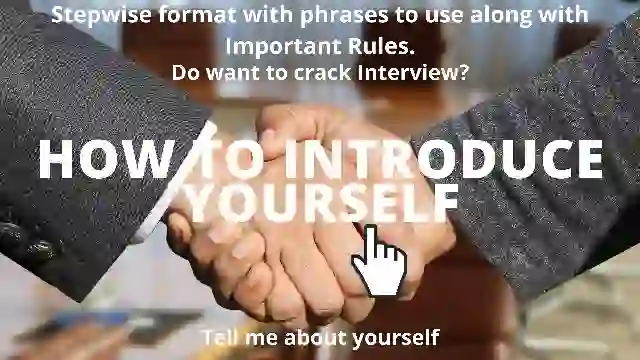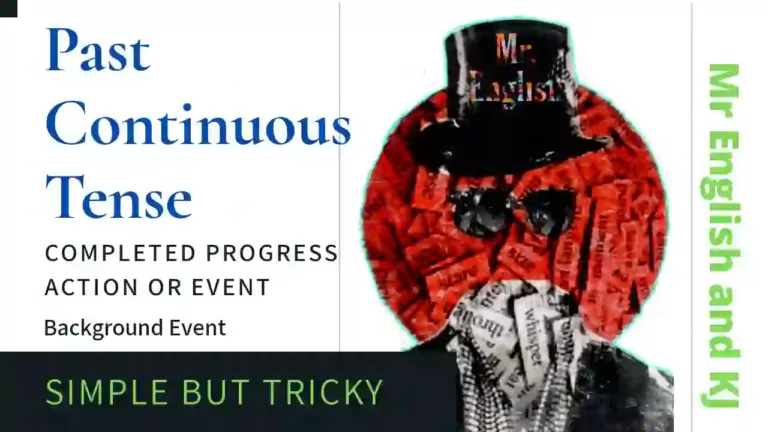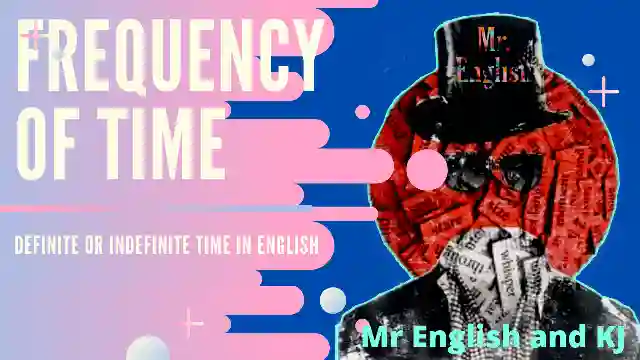
How to introduce yourself, tell me about yourself
HOW DO YOU INTRODUCE YOURSELF?
When someone says, “Tell me about yourself”, do you freeze? 🤔
At first, I froze too, but don’t worry —you’ll face this question in job interviews, school, college, and even casual conversations. In this guide, I’ll show you how to introduce yourself professionally with simple steps, phrases, and real examples.
“To Give an Introduction” is not that difficult. We know that people usually ask it, so why don’t we prepare for it in advance?
I usually give interviews to practice and see the latest trends in the interview world. So far, I have given 70+ interviews, and I am still giving more and more. Whatever I am telling you here is based on my experience and research.
A Fun Segment:
KJ – Hi, I am KJ. This is Mr English. Could you introduce yourself?
Mr English – I am Mr E. I am a student. My strength is that I am good at everything. My weakness is that I cannot speak English. We are four members at home. My father works at the office and my mother also works at the office. My brother is studying in college. His college name is…
KJ – Ahhh! Stop it! Stop it! That’s enough.
Mr Monkey – May I try?
KJ – Yeah, you can.
Mr Monkey – Yo! Myself Monkey, and I am from the jungle. Interesting place, isn’t it? I am an accountant. My strength is, I can climb trees. My weakness is, I cannot calculate numbers.

KJ – What is your opinion on this? [You can tell me in the comment section.]
KJ – Don’t make these mistakes in your introduction. We are going to learn a few rules to use for making your introduction better.
There are generally three types of introduction and 5 Rules of Success:–
- What is a Casual Introduction?
- Professional Educational introduction: used for school or college interviews
- Job Introduction: How to introduce yourself
- No Weakness.
- FAQs
What is a Casual Introduction?
Where do we use the Casual or Informal Introduction?
The introduction “Mr Monkey” gave is an informal introduction. You cannot use it in office, school, or college interviews. It is a casual and friendly way to tell about yourself.

It’s like when you are hanging out with your friends at parties, functions, or ceremonies. You are talking to new people, not for official purposes, just for general purposes to make new friends. That is informal.
In functions, if you use a formal introduction, it makes the conversation boring. People don’t take an interest in you. If you want to make new friends, you should use an informal introduction.
Step 1. Greetings
You can start a conversation by saying –
- Yo!
- Hey!
- What’s up!
- Wassup!
So, they can answer, and then you start talking about yourself.
Step 2. Your Name
A few phrases you can use to introduce yourself, like –
- I am Sam / (Your Name).
- Myself Sam / (Your Name).
- People call me Sam / (Your Name).
- My friends call me Sam / (Your Name).
- My parents call me Sam / (Your Name).
- I am Sameul, but you can call me Sam.
These phrases present yourself or make yourself more charming or attractive. So, try to use it in an informal way, not in a formal way.
Step 3. Address
After “Step 2,” talk about your address, not your exact location. You should tell your home address and your place where you come from. You can use a few phrases like –
- I live in (your address).
- I hail from (_______).
- My residence is in (_____).
- I reside in (______).
So, you can fill the blanks by telling your place, like Delhi, New York, Columbia, or anywhere, etc. It is not always needed. It is not that important to inform, but if you want to, you can tell them.
Step 4. Profession or Hobby
About your profession, be specific, do not explain or elaborate, just say a word like –
- I am (a doctor).
- Being (a doctor) is my profession/hobby.
Here, in the place of the doctor, you can mention anything. If you want to tell others about your hobbies, what you like, or what you hate, you can learn more phrases from here.
Remember – Be specific, don’t be over-elaborative on it.
There are some rules that you must follow to have a flawless introduction. By following these rules, you can always improve your intro and make it better than before.
Rule No. 1 – Connect With Situations
- Connect with situation means, if you’re in a party talk like you are in a party so, be specific.
- Simply take thirty-seconds to introduce yourself, do not take more than that.
- Say something interesting about you, about your profession only if you have.
- If you do not have then you can mention anything related to that topic or related to that situation.
- As I suggested if you are in a party, talk about parties.
Suppose that you are in a fashion show and you say, that I like this model or I like that outfit. It is called Connect with Situations because everyone is there for the fashion show.
If your profession is interesting or you can make it sound interesting, then talk about it to make the conversation fun and related to the environment. The introduction is a way to snoop in and make new friends. So be interesting and charming.
Step 5. Ask About Themselves
It is not a job interview where you are only giving answers. Ask them, “Tell Me About Yourself.” It is an informal introduction, so it is important to ask them “What about you? or How about you?”
Remember the important point after they introduce themselves.
Say them – “Nice to meet you.”
or
When the conversation is over then say – “Nice meeting with you.”
That means the conversation is over and you both are going to their seperate ways.
- Nice meeting with you. (At the End)
- Nice to meet you. (At the Beginning)
Professional Educational introduction: used for school or college interviews
This is a formal introduction, not an informal one. You can introduce yourself in college, school, or on a podium before giving a speech.
In some college or school entrance exams, they conduct an interview before giving admission. Your introduction makes a great impact there. You should not take it lightly. If you are preparing for entrance exams like SAT: you can practice them from here.
Step 1. What is your name?
Always start by telling your name.
- My name is (______).
- I am (_____).
‘My name is (___),’ it is the best for formal; do not use an informal way of introduction here.
Step 2. Your Residence
About your residence, a place where you live, use some phrases like –
- I live in (_____).
- I reside in (______).
If your birthplace is different, then you can use that –
- I belong from ______ (your place).
- My birthplace is _____ (the name of that place).
- I am from __________ (your place).
Step 3. Your Qualification
About your education, if you have already mentioned it or they have known before you have even started introducing yourself, then you don’t need to mention it again. Cause if you do, then it sounds like you have remembered your introduction, which is a big no.
No repeating applies to all other things, too. It is best that you summarize all the repetitive things. But if you want to repeat all of it again, then there is a phrase that you should use before telling “As you already know…”
Remember the rule first: “Connect with Situation.” If the situation allows you to mention your education, then do it; otherwise, don’t.
You can talk about your experience if you have one, because some students work as well as study.
Step 4. Any Special Activity or Talent
If you have done something extra besides your education, then do mention it. It is important to have other skills besides your curriculum.
Step 5. About Your Family
You can mention your family, like their name, work, and relationship with you.
We are ( 3 ) brothers and sisters. (For brothers and sisters, you can say ‘siblings.’)
e.g. – if you are 2 brothers and 1 sister then you can say – we are 3 siblings.
– If you are 1 brother and 2 sisters still you can say – we are 3 siblings.
Phrases you can use –
- Apart from my parents, we are _____ siblings.
- There are ______ members in my family.
You can mention your family’s profession by using these phrases –
- My father works as ________ (then your father’s Profession).
or - My father is a ______ (than your father’s profession).
- You can use similar like for your mother and brother but if your mother is a homemaker, use homemaker.
- Do not say house maker cause it denotes that she builds a house, like construction labours build a house.
- So you can say homemaker, a homemaker is better. It means, she connects the whole home, means a family connector.
- You can also say ‘we are two brothers and sisters.
- If the brother/sister is younger, then you can say – younger brother/sister. (that means the age of your brother/sister is lesser than your age.)
- If they are older/elder that means their age is more than yours. So, you can use elder brother and sister otherwise sibling is the best.
Step 6. Your Future Goal or Aim
Tell them about your goal and aim in your introduction – ‘What do you want to be in the future?’
For talking about your goals and aims, you can use these phrases like –
- I want to be ______.
- My dream/my aim/my goal is to be ______ .
- I am passionate for being _______ .
- My passion is to be _______.
- I (always) think about being/to be ______.
- I am dedicated to be _______.
- Every second of a moment, I (always) think about being/to be _______.
In the blanks, you can use your profession, like doctor, engineer, or anything else you can mention.
Job Introduction: How to introduce yourself
If you are trying to crack a job interview or ascend on corporate ladder, then you should work on your introduction. Let’s move on to the most important part, “Job Interview Introduction.”
Step 1. Your Name
- My name is _____. (Always use ‘my name is ___.’ Do not use anything else except for ‘My name is _____.’ Cause it is the most formal out of all.)
Step 2. Your Address
You can use similar address phrases like you used in an educational interview.
Step 3. Your Work Experience
Regarding your experience, it is very important because it indicates whether you are eligible for this job or not. Therefore, prepare thoroughly for the experience.
Remember you must mention your latest experience first then move backwards to last.
Rule No. 1st “Connect with the situation” – understand where you are actually. If you are in a marketing interview, tell only your marketing experience, the rest of the experience is important but at the end.
Rule No. 2 – Prepare a Background Story or Back-Up Plan
Remember Rule No. 2: prepare the background story, because if you are mentioning your experience, then they will definitely ask a few questions about your experience that –
- How did you manage that?
- How did you do that?
- What was the biggest challenge you have faced?
- How did you learn that?
- What did you learn from your mistake?
So, you always prepare for the background story because if you are fluent in talking about your introduction, then they will ask a few questions about the information you have shared with them about you.
If you are unable to answer their questions, then they can judge that you are not good or eligible for the job, so always prepare the background story.
In simple words, a background story is everything that you have mentioned in your introduction.
For example:- If you say, I am a librarian. I have three years of experience. My work is to arrange books or manage their places. (So, if they ask how do you do that and you don’t know how to express it in English, then it shows you don’t know your job very well. Bad Impression!)
There are a few general questions. They always ask like –
- Tell me about yourself
- How was your last trip or vacation?
- How was your last experience (in any company that you mentioned)?
- What’s your future plan?
- Where do you see yourself after (five years/ten Years/four years, they can mention)?
- What’s your daily routine?
- Why do we hire you?
- When was the last time you made a mistake, and how did you deal with it?
- What did you learn from your last mistake?
- Why are you leaving your last job?
So, these general questions, they normally ask you, prepare them.
Rule No. 2 (remember background story), always prepare it, make a note at home, remember it, read it again and again. So, you don’t need to hesitate in front of them because you know what they will ask you.
What tense or Verb can you use to answer these questions?
- How was your last experience, trip, or vacation? (you can use Present Simple, Past Simple, or Past Verb)
- About your future aim – where do you want to see yourself? (then you can use Future Verb or Present Simple)
- Your daily work in your office. (You can use Present Simple or Present Verb.)
- Notice the tense or time that is asking of you, and try to make sentences based on that time. My suggestion would be to stick with one tense or time for the particular question.
Step 4. Educational Background
Do not mention everything you have done; focus on the job and only mention what is related to the job. Any unrelated education will only cause you problems.
A few phrases you can use when talking about your education: you can say –
- I have passed ________ (your graduation degree) in that ______ (in the place or in that time you can mention the place/time there.)
- I completed my _______ (graduation or master’s degree you can mention that.)
Step 5. Other Special Activities
For other special activities, you should also follow Rule No. 1 (connect with the situation), so your activity is based on your job or your profile for which you are applying. If you are going for a marketing job, your special activities would be based on marketing.
For example:- If you are going for a librarian job and you told them that I won a race in my college. On the other hand, another person said – I helped my librarian in college, and he gave me a prize.
Which one is better?
If you do not have any special activities, then you can talk about the race, but you should mention some special ways to make it more attractive. Always use an example to demonstrate better.
If you have said, I have won a race. You can still connect it with the librarian job, like I have won a race, and I am still maintaining myself at that fitness level to work all day without getting tired.
This seems more attractive and related. If they ask more about the race, or so then what do you do? Hence, you need to prepare Background Stories.
Mr English – Congratulations! You got the job.
Step 6. Your Strength or Ability or Likeness
Your strength, ability, or likeness should be related to your job. “Not all should be related, but some, because all seems like you are doing intentionally to please them.” If you are finding a job as a marketer, then your strength should be in marketing or accounting, you should have accountability, or any strength that is related to your accounting role.
For example, as a marketer, you can say –
- I am good at bargaining/convincing others, or
- I like to research data, or
- Bargaining before buying anything is what I prefer the most.
Or for an accounting job, you can say –
- I am good at calculating numbers.
- I like to maintain data. Even in my free time, I arrange and manage all my expenses.
Rule No. 3 – Be Yourself or Stay Natural
You know yourself better than others. So do not say things that you don’t have. In simple words, don’t lie in your resume and introduction. You can exaggerate, but do not give a clean lie. If you want to lie, then don’t forget to prepare a background story to make it real.
Because if you are saying, I’m good at calculating numbers and they ask you some numbers to calculate, and you cannot, then it’s a negative point for you. You can protect yourself from embarrassment if you prepare for it in advance, hence Rule No. 2.
Remember the most important thing, do not mention your family cause “They are not arranging a marriage to you for their daughter or son.”
They want you for the job; you are important, so focus on yourself in the introduction. If they ask about your family, then talk about it; otherwise, don’t.
Step 7. Your Goals or Aim
When you talk about your future goals and aims, you can use similar phrases to those you have used in the educational introduction. Remember, don’t say anything that can cause you trouble.
For example:- Don’t say that I want to gain more experience to go into a big company.
or
I want to see myself after five years in your position.
It’s a bad impression.
There are a total of 5 Rules –
- Rule No. 1 – Connect the situation.
- Rule No. 2 – Background story or a back-up plan.
- Rule No. 3 – Be yourself.
Rule No. 4 – Don’t Memorize
Don’t speak over fluent because if you have prepared the introduction at home multiple times. You may talk like you are reading. I saw a lot of students when I asked them their introduction, they talk like reading, they don’t stop. They tilt their heads up and try to remember what will be the next line. It clearly shows that they have crammed it (Cram = Mug up or remember something by repeating it a lot or memorize).
If you said your introduction at a super-fluent speed, then he asked the next question and you did not answer or you came to your normal speed or started stuttering, he could understand you remembered your introduction.
So Be Yourself and Behave Naturally.
Rule No. 5 – Speak Until They Listen
If an interviewer nodding his/her head, that means he/she wants to listen; so do not stop there, continue, and better prepare a five or six-minute introduction. Remember Rule No. 1 (connect the situation): if he/she is just nodding generally, then three minutes are enough.
No Weakness.
The most important thing is not to talk about your weaknesses until they ask. Suppose that if you are finding a stranger, do you tell them what your weaknesses are? No!
If they ask, then talk about that. Also, don’t talk about a weakness that can lose your job, so talk about a weakness that can easily be digestible.
They can understand, okay, it’s a minor weakness like –
Don’t say that I can’t speak in English because you said your whole introduction in English, now you are saying in your weakness I can’t speak English. (I heard that also from students.)
If you are in an accounting job, you can’t say – I am not a responsible person or I don’t like to take responsibility because the whole accounting job is about responsibility; use a weakness that is very minor.
For example:- If a teacher says that I cannot tolerate noisy people. It’s a very bad impression. So, find the very minor weakness.
Suppose, as a teacher, I can say I always try to push my students forward by teaching them all the adversity that they might face in the future, but some students think I am being too noisy because they want to enjoy and not focus on their lives.
It is a weakness in the form of strength. It’s very trendy nowadays to talk about a weakness that is actually a strength. So, let the interviewer be confused. Is that your weakness or actual strength? Prepare a background story because if they ask you, “How can you say that?” Then you are prepared for it.
FAQs
What is the best answer for “Tell me about yourself” in an interview?
👉 Keep it professional: Name, Experience, Education, Strengths, Goal. It’s best if you follow the sequence.
How long should an introduction take?
👉 Informal: 30 seconds.
Educational: 1–2 minutes.
Interview: 2–3 minutes max. But if they keep listening, then take it to 5 minutes also.
Should I include my family background?
👉 Only if asked. Otherwise, focus on your skills and experience.
How to introduce yourself or Tell me about yourself, do they ask only this way?
👉 No, an interviewer can ask for your introduction in any way possible. There is no one question to it. You must understand calmly what they are asking of you.
Why I should not disclose my weaknesses in an interview.
👉 A weakness is a thing that an interviewer asks you in many ways, so always keep that in mind: “Have you told your weakness already or not?”
For example: “What did you learn from your last mistake?” or “What is the one thing that you want to improve in yourself?”
They can find your weaknesses in many ways, so practice limiting yourself to one or two weaknesses at most.
I hope you understood the steps, rules, and phrases. If you follow the rules and steps, you’re going to crack the interview next time definitely. These ways are so generic for giving self-introduction anywhere. Best of luck with your next interview.
The Early Bird Gets The Worm!
Practice in Comment Section: I assure our Team will help improving your Introduction.

